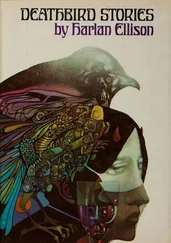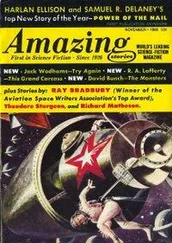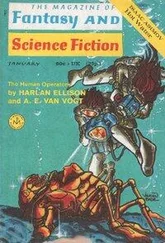Rusty bristled at the offhand remark, but answered humbly, “Yessir.”
“Okay then, get the devil out of here. I can’t stomach looking at your ugly face.”
Rusty felt anger frying the insides of his gut, but he held it back. He needed some information. “ ’Scuse me, sir.”
Bedzyk looked up blackly. “You still there?”
“ ’Scuse me, sir, but can you tell me like if they let out the other guys?” He thought of the blood in the bowling alley.
The cop stared the boy down for a long instant, then his neck cords began to stand out, and in a terribly soft slow voice he said, “Get the hell out of here.”
Rusty left as quickly as possible.
Outside, Boy-O was slouching against a wall, an ordinary cigarette dangling from his unshaven face. He smelled even stronger than usual and the wild, junkie-stare was so bad Rusty could have sworn a pair of diamonds were screwed into the sockets, blazing out.
Boy-O took a shove away from the wall, approached Rusty. The other tried to swerve around him, but the junkie said, “Hey, Rusty, hold up a second.”
Rusty stopped and looked at the hophead. “Whaddayou want?”
“I been waitin’ till they let the gang out. Some of the guys needed carfare like. They’re holdin’ three or four of the guys.”
So that explained what had happened to the Cherokees and the Cougars, but Rusty was impatient to be away from the great gray hulk of the police building. “So? Why you stoppin’ me?”
“I just wanted to tell ya I was sorry ta hear what happened.”
Rusty was puzzled. Boy-O never had been a good friend. What did he care if Rusty Santoro spent the night in a cell on a metal trough?
“For what? I’m out, ain’t I?”
Boy-O looked surprised, then shocked, then partial understanding filtered through to his dreamy brain. “Oh, hey, man, then you don’t know. Hey, that’s right, they didn’t find her till this mornin’, so you didn’t get the word yet.”
A chill slipped up Rusty’s neck and he grabbed the junkie by his filthy lapels. “What? What are you talkin’ about? Come on, you sonofabitch, open up or I’ll cream ya!”
He knew, somehow, horribly; even before Boy-O spoke.
“Your sister, man. They found her this mornin’. Somebody—uh—raped her and left her in an alley behind Tom-Tom’s joint.”
Rusty felt the anchors of his jaws tighten and he thought for a moment he would drop into the street. He had to know. He had to know —
“Tell me! Talk, you dustie, talk! How is she?”
Boy-O looked terrified, as though he were face to face with something alien. He wanted to run away, but Rusty had him fast and was choking him without knowing it.
He stammered and Rusty hit him across the mouth. “Talk! Talk!” He bit his lips in fury and screamed loud so the whole clean, fine, nice start-all-over day would know, “Tell me—how is she?”
“Gee, man, I’m sorry… She’s dead like. Somebody stuck a knife inta her.”
The past screamed and Rusty heard.
rusty santoro
moms
Somehow, the walk home, partially through quiet Cherokee turf, passed without his knowing it. His feet moved and his arms swung and he stopped for traffic lights when he stopped. But he saw nothing and no sounds or smells came through to him.
He was a five-foot nine-inch moving statue. He was on a trek through nowhere at all and he walked with steady persistence. Where thoughts had been, where the clean reach of the day had lain, nothing but a swirl of color remained. It was a wild mélange of heaving, surging dull orange, wisps of light gray almost blue, streaks sudden and painful of red and heavy black. It was impossible for anything to get in and nothing trapped inside could find its way free.
Shock!
The steady movement of feet that was completely unnoticed.
He opened the door to the apartment and walked in. No sound. No movement of air. A stillness and a softness almost oppressive in its totality. And yes, of course, the clock had stopped. He knew it would be like that, like a dream he had once had, and forgotten, now rushing back like the night wind to fill his mind. The clock had stopped, the unity was gone, Dolores was—
The word came then: Dead.
No, not dead. He said it once aloud to hear it, “No, not dead,” then added as though the word meant something for the first time, “murdered.”
No gang rumble where a nameless boy who held a switchblade lay with his belly split wide; no stomping of a Greenwich Village queer, so his head was mashed potatoes; no technicolor, CinemaScope, stereophonic daydream in an RKO shadow-house. This was real and it was the thing in itself. This was his sister, the last one, the lost one, and she was gone. And that was not just that. That was the end of a bit of the world that meant something, that had a way to the light, that moved and talked and swayed prettily to the phonograph’s noise, that tapped the fork at dinner, and that was too young—yes, goddamn it—too young to die.
The clock had stopped. Someone had let it waste its time to stillness. It meant something, but Rusty did not know what or why, or even if he should care about it. He wanted to cry. Why couldn’t he cry?
There was a vague noise from the kitchen. Moms.
He walked through the long railroad flat and into the kitchen where she prowled like a warm, soft gray animal.
He saw her as though he were looking through the wrong end of a telescope. Very far away and moving with terribly exaggerated actions—first at the vegetable bin, then at the sink, then carefully peeling the potatoes. Were they the only things in the world for her? Didn’t she know?
“Ma,” he spoke softly, and was surprised to hear how loud and unpleasant his voice sounded in the mausoleum stillness of the apartment. She turned to him, blank eyes that were luster-less and face devoid of expression. He knew her, then; knew her as she was inside, stripped as bare as the potatoes in the sink, with only the blank eyes left.
She turned back to her work without a word and began systematically to gouge out the potato eyes.
He repeated the single word. “Ma?”
She slumped a bit more from the shoulders and he thought he saw her shiver slightly. The trembling carried itself and he felt a weakness in the back of his own knees. “I was downtown, Ma,” he added.
She did not respond and he wondered if she had suddenly gone deaf. It was an odd feeling, all at once, and he thought of Rip Van Winkle. Had he been away more than one night in jail? Had he been shut up behind steel for, say, fifty years, and had now come back to a stranger who no longer knew him? It passed in an instant, but for that instant he was standing on a cold, empty highway, watching the Last Car Ever tooling away in dust.
“I said, I was downtown, Ma. I got picked up last night when I went after—” He stopped himself short. Dolores. He didn’t want to say her name like that. He wanted to build to it. At first, when he had come up the three flights of steps to the apartment, he had thought he would burst in and yell Where’s Dolo? Ma, Dolo’s dead! but the silence of the place had smoothed over the inferno within him.
The fire was still there, and he could feel it building, but he knew he must be careful. She had had it bad, and if she knew—
If she knew.
“Ma,” he hesitated. The words were like taffy in his mouth. “I talked to somebody, Ma. He t-told me Dolo was—Dolo’s—”
It would have to lie there. He was not going to say it.
She saved him the trouble.
“I know.”
The voice came from the other side of the universe and barely made the journey. Soft. Soft.
Читать дальше












